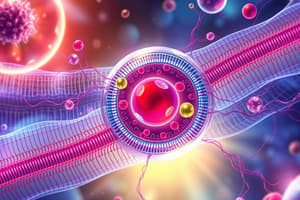Podcast
Questions and Answers
What is primarily analyzed when studying the impact of human activities on ecosystems?
What is primarily analyzed when studying the impact of human activities on ecosystems?
- The relationship between energy flow and trophic levels
- Case studies illustrating pollution, deforestation, and climate change (correct)
- The effects of abiotic factors on species distribution
- The role of microorganisms in soil formation
Which of the following aspects is essential for understanding ecosystems?
Which of the following aspects is essential for understanding ecosystems?
- Genetic variations in plant species
- The impact of climate change on human health
- Microscopic structure of bacterial cells
- The relationship between predator and prey in a biome (correct)
Which cycle involves processes that are critical to ecosystem function?
Which cycle involves processes that are critical to ecosystem function?
- Photosynthesis cycle
- Carbon, nitrogen, and water cycles (correct)
- Energy flow cycle
- Trophic level cycle
What is a major focus of conservation efforts in ecosystems?
What is a major focus of conservation efforts in ecosystems?
What type of interactions between organisms is a key part of ecological studies?
What type of interactions between organisms is a key part of ecological studies?
What is the primary focus of the 11th-grade biology curriculum?
What is the primary focus of the 11th-grade biology curriculum?
Which type of cells are characterized by the absence of a nucleus?
Which type of cells are characterized by the absence of a nucleus?
What key metabolic processes are covered in-depth in cell biology?
What key metabolic processes are covered in-depth in cell biology?
Which of the following concepts is essential in understanding Darwin's theory of evolution?
Which of the following concepts is essential in understanding Darwin's theory of evolution?
Which principle refers to the likelihood of offspring inheriting specific traits?
Which principle refers to the likelihood of offspring inheriting specific traits?
What mechanism of evolution involves the random change in allele frequencies within a population?
What mechanism of evolution involves the random change in allele frequencies within a population?
What method is used to visualize evolutionary relationships among organisms?
What method is used to visualize evolutionary relationships among organisms?
Which process involves the synthesis of proteins from mRNA?
Which process involves the synthesis of proteins from mRNA?
Flashcards
Biology 11th Grade
Biology 11th Grade
Advanced biology course building upon previous knowledge, covering complex biological processes, systems, and evolutionary theory.
Cell Biology
Cell Biology
Detailed study of cell structure, function, and organelles, including prokaryotic & eukaryotic cells; membrane transport; respiration & photosynthesis.
Cell Organelles
Cell Organelles
Specialized structures within cells that carry out specific functions, e.g., energy production, protein synthesis.
Mendelian Genetics
Mendelian Genetics
Signup and view all the flashcards
DNA Replication
DNA Replication
Signup and view all the flashcards
Evolution by Natural Selection
Evolution by Natural Selection
Signup and view all the flashcards
Phylogenetic Trees
Phylogenetic Trees
Signup and view all the flashcards
Biodiversity
Biodiversity
Signup and view all the flashcards
Genetic Drift
Genetic Drift
Signup and view all the flashcards
Gene Flow
Gene Flow
Signup and view all the flashcards
Ecosystem Interactions
Ecosystem Interactions
Signup and view all the flashcards
Predator-Prey
Predator-Prey
Signup and view all the flashcards
Competitive Interactions
Competitive Interactions
Signup and view all the flashcards
Food Webs
Food Webs
Signup and view all the flashcards
Trophic Levels
Trophic Levels
Signup and view all the flashcards
Human Impact on Ecosystems
Human Impact on Ecosystems
Signup and view all the flashcards
Biomes
Biomes
Signup and view all the flashcards
Carbon Cycle
Carbon Cycle
Signup and view all the flashcards
Nitrogen Cycle
Nitrogen Cycle
Signup and view all the flashcards
Water Cycle
Water Cycle
Signup and view all the flashcards
Conservation Efforts
Conservation Efforts
Signup and view all the flashcards
Study Notes
Introduction to Biology 11th Grade
- Biology 11th grade typically covers advanced concepts building upon foundational knowledge from previous years.
- The curriculum often delves into more complex topics, including specific biological processes and systems, as well as evolutionary theory.
- Depending on the specific school's curriculum, there might be an emphasis on particular areas, such as ecology or genetics.
- Common themes throughout the course include cell biology, genetics, evolution, and ecology.
- Students will likely learn about the structure and function of various biological systems in detail.
Cell Biology in Depth
- Students will investigate cell structure and function in greater depth.
- The role of organelles in various cellular processes (energy production, protein synthesis, etc.) will be studied.
- Different types of cells and their specializations will be examined, including prokaryotic and eukaryotic cells.
- Membrane transport mechanisms across cell membranes will be explored to understand how molecules move in and out of cells.
- Cellular respiration and photosynthesis are key metabolic processes covered in this area, which will include detailed explanations of the steps involved.
Genetics and Heredity
- The fundamental principles of Mendelian genetics are revisited and expanded upon with modern concepts of inheritance.
- Concepts such as dominant and recessive alleles, Punnett squares, and probability in genetics will be further developed.
- Students will explore the mechanisms of DNA replication, transcription, and translation, as well as gene expression and regulation.
- The role of mutations in genetic variation and evolution will be examined.
- Modern applications of genetics, such as genetic engineering and biotechnology, might be included depending upon the curriculum.
Evolution and Biodiversity
- Darwin's theory of evolution by natural selection will be examined in detail.
- Concepts such as adaptation, speciation, and evidence for evolution (e.g., fossil record, comparative anatomy) are crucial topics.
- Phylogenetic trees and cladograms will be utilized for visualizing evolutionary relationships among organisms.
- Various mechanisms driving evolution, including genetic drift, gene flow, and natural selection, will be explained with examples.
- Biodiversity and its importance in maintaining ecological balance will be covered. An understanding of ecosystem interactions, including predator-prey relationships and competitive interactions will be central in this area.
Ecology and Environmental Science
- Interactions between organisms and their environment (abiotic and biotic factors) will be studied.
- Concepts of ecosystems, food webs, and energy flow through trophic levels are critical.
- The impact of human activities on ecosystems (pollution, deforestation, climate change) will be analyzed, often with case studies from real-world scenarios.
- The structure and function of biomes will be examined. Students will also learn about the different stages and processes within the carbon, nitrogen, and water cycles.
- Conservation efforts and sustainable practices are often a major focus.
Other Possible Topics
- Depending on the specific curriculum, other topics such as microbiology, immunology, or other areas of biology might be included.
- Practical lab work, including experiments related to microscopy, genetics, and ecology, are generally integral to the course.
- Students will be expected to understand and apply biological principles and concepts outside the classroom through critical thinking and problem-solving.
Studying That Suits You
Use AI to generate personalized quizzes and flashcards to suit your learning preferences.




